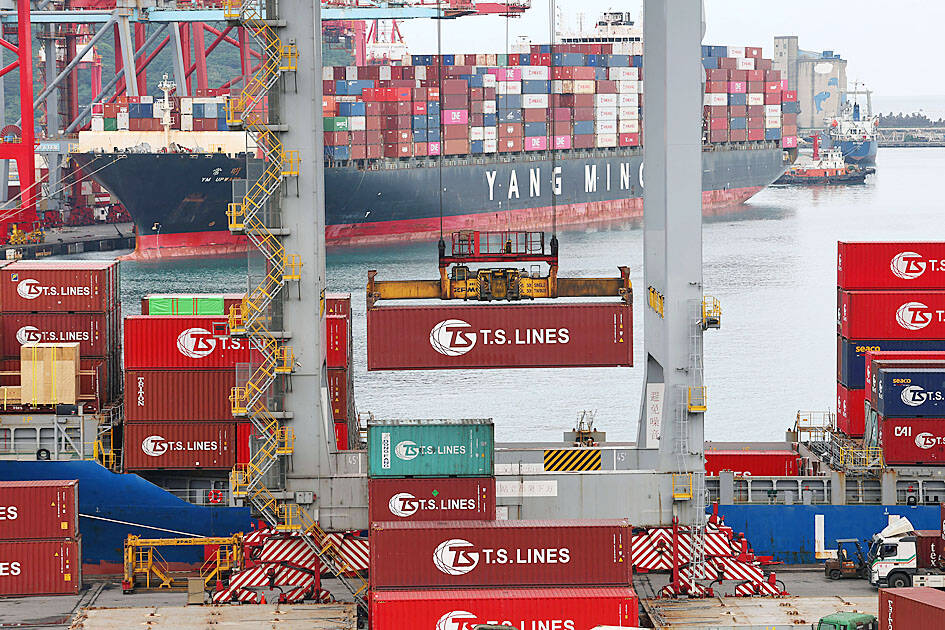Taiwanese shipping companies are handing out bumper mid-year bonuses, despite a slump in global cargo as the industry continues to benefit from earlier COVID-19 pandemic gains.
Yang Ming Marine Transport Corp (陽明海運) is awarding workers up to 30 months of salary on their next payday after shareholders on Friday last week approved the NT$2.3 billion (US$74.82 million) bonus, the Chinese-lanugage Economic Daily News reported yesterday.
That is in addition to a year-end bonus of 12 months of salary paid at the beginning of this year, the newspaper said.

Photo: CNA
Company rules dictate the shipping firm must distribute 1 percent of its previous year’s profit to employees as compensation, Yang Ming said in an e-mail, although the amount each member of staff receives is at the company’s discretion.
Evergreen Marine Corp (長榮海運) is to give its 3,100 workers another NT$1.9 billion, equivalent to about 12 months of pay, after shareholders on Tuesday approved the bonus, the report said.
The latest payments come on top of bonuses of about 50 months of salary in January after the maritime giant reported record profit of NT$334.2 billion for last year.
Evergreen did not immediately respond to requests for comment.
Shipping firms have enjoyed a windfall over the past two years on an industrywide surge in demand for consumer goods and freight rates during the COVID-19 pandemic.
However, that is waning, with economic uncertainty driving a slump in global shipping.
Evergreen’s net income is expected to plunge 94 percent this year to NT$18.6 billion, analysts’ estimates showed.
Yang Ming is forecast to see profit fall 99 percent to NT$2.2 billion, analysts’ estimates showed.

CHIP RACE: Three years of overbroad export controls drove foreign competitors to pursue their own AI chips, and ‘cost US taxpayers billions of dollars,’ Nvidia said China has figured out the US strategy for allowing it to buy Nvidia Corp’s H200s and is rejecting the artificial intelligence (AI) chip in favor of domestically developed semiconductors, White House AI adviser David Sacks said, citing news reports. US President Donald Trump on Monday said that he would allow shipments of Nvidia’s H200 chips to China, part of an administration effort backed by Sacks to challenge Chinese tech champions such as Huawei Technologies Co (華為) by bringing US competition to their home market. On Friday, Sacks signaled that he was uncertain about whether that approach would work. “They’re rejecting our chips,” Sacks

It is challenging to build infrastructure in much of Europe. Constrained budgets and polarized politics tend to undermine long-term projects, forcing officials to react to emergencies rather than plan for the future. Not in Austria. Today, the country is to officially open its Koralmbahn tunnel, the 5.9 billion euro (US$6.9 billion) centerpiece of a groundbreaking new railway that will eventually run from Poland’s Baltic coast to the Adriatic Sea, transforming travel within Austria and positioning the Alpine nation at the forefront of logistics in Europe. “It is Austria’s biggest socio-economic experiment in over a century,” said Eric Kirschner, an economist at Graz-based Joanneum

BUBBLE? Only a handful of companies are seeing rapid revenue growth and higher valuations, and it is not enough to call the AI trend a transformation, an analyst said Artificial intelligence (AI) is entering a more challenging phase next year as companies move beyond experimentation and begin demanding clear financial returns from a technology that has delivered big gains to only a small group of early adopters, PricewaterhouseCoopers (PwC) Taiwan said yesterday. Most organizations have been able to justify AI investments through cost recovery or modest efficiency gains, but few have achieved meaningful revenue growth or long-term competitive advantage, the consultancy said in its 2026 AI Business Predictions report. This growing performance gap is forcing executives to reconsider how AI is deployed across their organizations, it said. “Many companies

France is developing domestic production of electric vehicle (EV) batteries with an eye on industrial independence, but Asian experts are proving key in launching operations. In the Verkor factory outside the northern city of Dunkirk, which was inaugurated on Thursday, foreign specialists, notably from South Korea and Malaysia, are training the local staff. Verkor is the third battery gigafactory to open in northern France in a region that has become known as “Battery Valley.” At the Automotive Energy Supply Corp (AESC) factory near the city of Douai, where production has been under way for several months, Chinese engineers and technicians supervise French recruits. “They